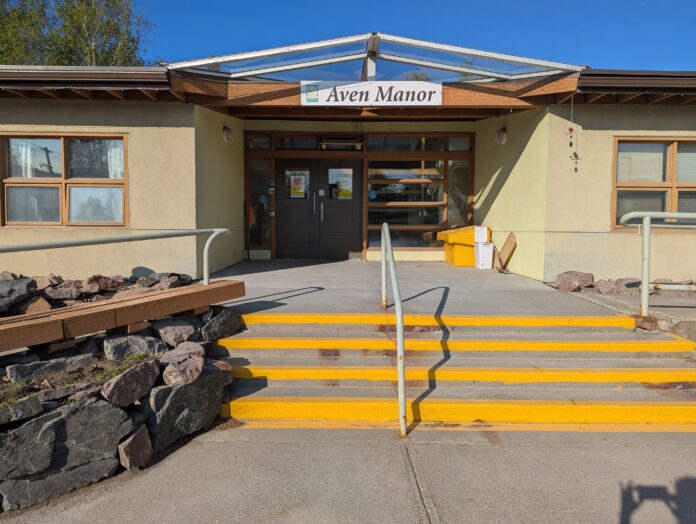A seniors’ care group is calling out what they say are “deficiencies” in a policy that could set the stage for how older adults in long-term care and their care workers are accounted for during emergency evacuations.
AVENS, an organization that provides care and housing for older adults, said they were forced to evacuate nearly 60 older adult residents and received almost no assistance from GNWT.
“In August 2023 AVENS was forced to evacuate 57 vulnerable residents with virtually no assistance from the Government of the NWT. All AVENS residents, including some from Hay River and Fort Smith long term care facilities who were moved to AVENS only days before the Yellowknife evacuation, were selected by the GNWT for placement at AVENS, which provides long term care services under contract with the Northwest Territories Health and Social Services Authority,” AVENS said.
The organization is now asking the territorial government to reimburse them for $400K in costs they incurred and continued to carry since the 2023 wildfire evacuations.
Colleen Wellborn, who is the board chair at AVENS, told True North FM that the GNWT’s After Action Review Report did not address critical gaps. Wellborn said AVENS bore much of the financial costs of the evacuation themselves, which is something the organization should not be expected to do.
AVENS said that the report lacked guidelines for how non-governmental organizations like themselves should pay essential workers during an evacuation.
“As a not-for-profit partner of NTHSSA, our role is vital. Yet the report ignores the strain placed on our organization in the absence of any policy to compensate essential staff or operational expenses during emergencies,” said the seniors’ care group.
Last week at the Legislative Assembly, MLA Robert Hawkins said he plans to bring forward a motion to reimburse AVENS.
Wellborn said AVENS invested significant time and effort in trying to assess how to deal with essential workers during a time of uncertainty and explained it was challenging to hear that, despite the decisions made for the benefit of the residents, EVANS was not eligible.
GNWT’s Health and Social Services Authority said that AVENS costs claims are related to incentive pay, which according to them, does not qualify for reimbursement under current disaster assistance policies.
Krystal Pidborochynski, who is the communications director of NWT’s Health and Social Services Authority provided True North with a statement on behalf of the organization.
Pidborochynski told True North FM that the health and social services authority, along with the Department of Municipal and Community Affairs worked with AVENS to assess disaster-related expense claims arising from the 2023 wildfire evacuation.
GNWT’s current disaster assistance policies have specific guidelines around what expenses are eligible for reimbursement, said Pidborochynski.
“If the claims do meet the requirements under the Federal Disaster Financial Assistance Arrangements, they will not be eligible for reimbursement.”
Pidborochynski said AVENS was given two reimbursements for disaster-related expenses. Pidborochynski said the remainder of the claim amount was related to incentive pay, something that the Health and Social Services Authority said is not covered under the current disaster assistance policies.
“The part of the claim from AVENS that did not qualify for reimbursement was for an incentive paid to employees to work their regular shifts during the evacuation. While incremental staffing costs such as overtime or hiring additional staff may qualify as disaster-related expenses, incentive payments are ineligible as a disaster-related expense,” said Pidborochynski.
The organization said that because they were left with less than one quarter of their care team staff, they had to locate care sites and enlist extra support to ensure that their residents were cared for during the four weeks they spent in Alta. after evacuating.
“This was done with no government aid and resulted in AVENS incurring over $1.3 million in new costs to transport, house and safely care for AVENS residents. Of this amount, just over $900,000 was reimbursed to AVENS under the Government of Canada’s Disaster Financial Assistance fund. The balance of $400,000 in essential staffing costs remains unpaid. Currently, the GNWT has refused reimbursement of this staffing cost and AVENS continues to carry this financial burden two years after the evacuation,” said the seniors’ care group.
Welborn explained that one of the challenges once their long-term care residents were relocated safely, something she said that in and of itself was quite a challenge, was ensuring care was available for residents.
“Obviously, the health and safety of these vulnerable people was hugely important,” explained Wellborn.
When people have health conditions, they rely on care workers for various things, whether it’s administering medication or helping them move or get dressed, said Wellborn.
“So not only was it important that there were appropriate levels of staff taking care of people, but also that there was some continuity in staff, some of our residents have various stages of decline and so recognising, the people that help them day in and day out and having relationships with them is really important. So I think it was pretty exceptional what AVENS was able to do in terms of looking after everybody and finding very suitable accommodations and working with Alberta Health Services and working with vendors and contractors in Alberta,” said Wellborn.
At that time, there was a lack of information about certain policies or procedures and how to ensure the continuity of services
“So at the time AVENS made some decisions, obviously, that all cost money, whether it was adding additional security measures, additional staffing requirements, things like that. And so in the absence of direction or communication from the government, at the time, AVENS made the decisions operationally to make sure that the residents were looked after,” said Wellborn.





